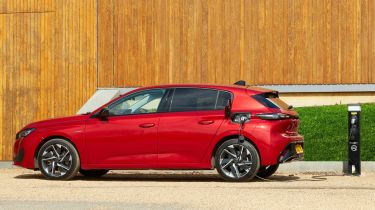Peugeot 308 review - MPG, running costs & CO2
"There are petrol, diesel and hybrid engine options, each suited to different types of owners"
There’s bound to be a Peugeot 308 that suits your needs because there are mild-hybrid petrol, diesel, and plug-in hybrid options, as well as the fully electric E-308. In general, we would recommend the mild-hybrid petrol to those who do a mix of motorway journeys and shorter trips around town.
Diesels work best for those doing a lot of long-distance drives, while plug-in hybrids are great for those with a short commute that can be done on electric power alone, so long as you can keep it charged up at home. The plug-in hybrid is also a good option for company-car drivers because of the low CO2 emissions figures.
Peugeot 308 MPG & CO2
The 1.2-litre three-cylinder petrol engine was a solid choice for the entry-level car, achieving up to 51.9mpg, but has since been discontinued. Now there’s a sole mild-hybrid version of the same engine that arrived in 2024, boosting economy to up to 62.6mpg. While the standard petrol had CO2 emissions between 123g-147g/km, the mild hybrid’s span 102-131g/km.
If you do a lot of long trips then you might consider the 1.5-litre BlueHDi diesel as an option. This engine emits 124-148g/km and returns between 50.1mpg and 59.6mpg on the combined WLTP test, so the higher figure should be realistic on a long motorway journey. Given it costs more than the mild hybrid and doesn’t boast particularly high mpg figures in comparison, it’s hard to make a case for the diesel.
 The most economical cars 2025 – petrol, diesel, hybrid and plug-in hybrid
The most economical cars 2025 – petrol, diesel, hybrid and plug-in hybrid
There’s now a sole plug-in hybrid model replacing the 180 and 225 models, badged the 195. It has a power figure between those two but – more importantly – is capable of up to 49 miles of electric range, which is longer than the 36-mile figure from before. That means official CO2 emissions are lower because it can go further without activating the petrol combustion engine. At just 18g/km of CO2, it incurs a BiK rate (Benefit-in-Kind) rate of 9%, which is a 4% reduction compared to the model that came before, making it even better for company-car buyers.
More reviews
Fuel economy is tough to work out for the plug-ins because it depends on usage – plug in every day and avoid using the engine at all costs and Peugeot quotes figures of 428mpg, but that’s unlikely to be the reality. If you use the engine a lot, the economy figure could drop below that of the standard 1.2-litre petrol engine, because the engine also has to lug around a heavy battery. While the official EV range is 49 miles, that’s also bound to be lower in real-world driving. This is still a very respectable figure, that should cover most commutes without consuming too much fuel, though plug-in versions of rivals such as the Volkswagen Golf and Audi A3 can still go further.
Insurance groups
The 308 spans groups 20-21, which is a little higher than some family hatchbacks, perhaps because there’s no manual option. Plug-in hybrids span groups 28 and 29, depending on the trim.
Warranty
All new Peugeots get a three-year/60,000-mile warranty, which is traditional for most manufacturers. If you want a family hatch with a longer warranty you could consider a Hyundai i30, a Kia Ceed or a Toyota Corolla, as those makers offer much longer factory warranties.
Servicing
Peugeot offers servicing plans that let you pay monthly instead of in a lump sum when servicing time comes. Some Peugeot dealers will even come and get the car from you and deliver it back, plus offer a video showing you what has been done.









